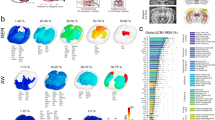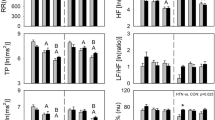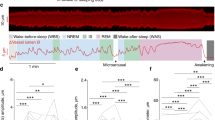Abstract
IN the past few years there has been increasing interest in cardiovascular changes during sleep, on the assumption that they might provide some insight into the neural control of circulation in a natural condition. The hypothesis that all cardiovascular events that occur during sleep are neurally mediated has never been crucially proved, however. Furthermore, sleep is accompanied by various haemodynamic phenomena which may well have different mechanisms. In the cat the greatest cardiovascular changes occur during desynchronized sleep (DS)1,2, a stage of sleep characterized by a desynchronized electroencephalogram and bursts of rapid eye movements, and in man associated with dreaming. We have shown recently that the arterial hypotension occurring during DS is dependent chiefly on a decreased peripheral resistance, change in cardiac output being small3. This is particularly true for animals subjected to sino-aortic deafferentation3, whose hypotension during DS is greatly exaggerated because of the removal of a buffer action exerted by arterial chemoceptors4. But in the few DS episodes during which hypotension is so profound as to cause electroencephalographic signs of cerebral anoxia (a phenomenon observed in deafferented animals only), the very large decrease in arterial pressure seems to be exclusively a consequence of a dramatic fall in cardiac output3. It has been suggested3, though not demonstrated, that the decrease in peripheral resistance might result from a reduction of sympathetic vasoconstrictor activity. The decrease in cardiac output, which is independent of cardiac innervation3,5, may also be a consequence of a reduction of sympathetic activity resulting in a dilatation of capacitance vessels and a decreased venous return, although non-neural mechanisms may well be involved.
This is a preview of subscription content, access via your institution
Access options
Subscribe to this journal
Receive 51 print issues and online access
$199.00 per year
only $3.90 per issue
Buy this article
- Purchase on Springer Link
- Instant access to full article PDF
Prices may be subject to local taxes which are calculated during checkout
Similar content being viewed by others
References
Candia, O., Favale, E., Giussani, A., and Rossi, G. F., Arch. Ital. Biol., 100, 216 (1962).
Guazzi, M., and Zanchetti, A., Science, 153, 397 (1965).
Kumazawa, T., Baccelli, G., Guazzi, M., Mancia, G., and Zanchetti, A., Experientia, 23, 1021 (1967).
Guazzi, M., Baccelli, G., and Zanchetti, A., Amer. J. Physiol., 214, 969 (1968).
Guazzi, M., Mancia, G., Kumazawa, T., Baccelli, G., and Zanchetti, A., Cardiovascular Res., 2, 265 (1968).
Cannon, W. B., Newton, H. F., Bright, E. M., Menkin, V., and Moore, R. M., Amer. J. Physiol., 89, 84 (1929).
Iwamura, Y., Uchino, Y., Ozawa, S., and Torii, S., Proc. Japan Acad., 42, 837 (1966).
Baust, W., Weidinger, H., and Kirchner, F., Arch. Ital. Biol., 106, 379 (1968).
Author information
Authors and Affiliations
Rights and permissions
About this article
Cite this article
BACCELLI, G., GUAZZI, M., MANCIA, G. et al. Neural and Non-neural Mechanisms influencing Circulation during Sleep. Nature 223, 184–185 (1969). https://doi.org/10.1038/223184a0
Received:
Issue Date:
DOI: https://doi.org/10.1038/223184a0
This article is cited by
-
Circadian rhythm of arterial blood pressure and albuminuria in diabetic nephropathy
Kidney International (1996)
Comments
By submitting a comment you agree to abide by our Terms and Community Guidelines. If you find something abusive or that does not comply with our terms or guidelines please flag it as inappropriate.



